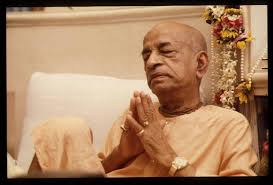…Everyone can see God—
(The Journey of self Discovery2-Everyone can see God)
People sometimes ask, “Have you seen God?” or “Can you show me God?” Sometimes we meet these questions. So the answer is “Yes, I am seeing God. You can also see God; everyone can see God. But you must have the qualification.” Suppose something is wrong with a motorcar; it is not running. Everyone is seeing it, but a mechanic sees it differently. He’s qualified to see it with greater understanding. So he replaces some missing part, and immediately the car runs. But although for seeing a machine we require so much qualification, we want to see God without any qualification. Just see the folly! People are such rascals, they are such fools, that they want to see God with their imagined qualifications.
Kṛṣṇa says in the Bhagavad-gītā, nāhaṁ prakāśaḥ sarvasya yogamāyā-samāvṛtaḥ: [Bg. 7.25] “I am not exposed to everyone. My energy, yogamāyā, is covering Me from their vision.” So how can you see God? But this rascaldom is going on—this “Can you show me God?” “Have you seen God?” God has become just like a plaything, so that cheaters advertise some ordinary man by saying, “Here is God. Here is an incarnation of God.”
Na māṁ duṣkṛtino mūḍhāḥ prapadyante narādhamāḥ [Bg. 7.15]. Sinful rascals, fools, the lowest of mankind—they inquire like that: “Can you show me God?” What qualification have you acquired by which you can see God? Here is the qualification: tac chraddadhānā munayaḥ. One must first of all be faithful (śraddadhāna). One must actually be very much eager to see God. …..
There is a story in this connection. It is very instructive, so try to hear. One professional reciter was publicly reciting the Śrīmad-Bhāgavatam, and he was describing that Kṛṣṇa is very highly decorated with all kinds of jewels when He goes to tend the cows in the forest. So, there was a thief in that meeting, and he thought, “Why not go to Vṛndāvana and plunder this boy? He’s in the forest with so many valuable jewels. I can go there and catch the child and take all the jewels.” This was his intention. So he was serious. “I must find that boy,” he thought. “Then in one night I shall become a millionaire.”
The thief’s qualification was his feeling: “I must see Kṛṣṇa! I must see Kṛṣṇa!” That anxiety, that eagerness, made it possible for him to actually see Kṛṣṇa in Vṛndāvana. He saw Kṛṣṇa in just the same way as the Bhāgavatam reader had described. Then the thief said, “Oh, You are such a nice boy, Kṛṣṇa.” He began to flatter Him; he thought that by flattering Him he would easily take all the jewels. Then he proposed his real business: “May I take some of these ornaments? You are so rich.”
“No, no, no,” said Kṛṣṇa. “My mother will be angry! I cannot give them away.” Kṛṣṇa was playing just like a child.
So the thief became more and more eager for Kṛṣṇa to give Him the jewels, but by Kṛṣṇa’s association he was becoming purified. Then at last Kṛṣṇa said, “All right, you can take them.” Then the thief became a devotee immediately, because by Kṛṣṇa’s association he had been completely purified. So somehow or other you should come in contact with Kṛṣṇa. Then you’ll be purified.
The gopīs are another example of great eagerness to see Kṛṣṇa. The gopīs came to Kṛṣṇa, being captivated by His beautiful features. They were young girls, and Kṛṣṇa was so beautiful. Actually they were lusty when they came to Kṛṣṇa, but Kṛṣṇa is so pure that they became first-class devotees. There is no comparison to the gopīs’ devotion, because they loved Kṛṣṇa with heart and soul. That is the qualification. They loved Kṛṣṇa so much that they didn’t care for family or reputation when they went out in the dead of night. Kṛṣṇa’s flute was sounding, and they were all fleeing their homes. Their fathers, their brothers, their husbands all said, “Where are you going? Where are you going in this dead of night?” But the gopīs didn’t care. They neglected their children, their family, everything. Their only thought was, “We must go to Kṛṣṇa.”
This eagerness is required. We must be very, very eager to see Kṛṣṇa. Many gopīs who were forcibly stopped from going to Kṛṣṇa lost their lives because of their great feelings of separation. So this eagerness is wanted; then you can see God. Whether you are lusty or a thief or a murderer or whatever it may be—somehow or other you must develop this eagerness, this desire: “I must see Kṛṣṇa.” Then Kṛṣṇa will be seen.
The first thing Kṛṣṇa is looking for is how eager you are to see Him. Kṛṣṇa will respond. If you are actually eager to see Kṛṣṇa—whether you are lusty, or you want to steal His ornaments, or some way or other you have become attracted to Kṛṣṇa—then it is sure your efforts will be successful.
But you must desire Kṛṣṇa only. In this connection, Rūpa Gosvāmī has written a verse:
smerāṁ bhaṅgī-traya-paricitāṁ sāci-vistīrṇa-dṛṣṭiṁ vaṁśī-nyastādhara-kiśalayām ujjvalāṁ candrakeṇa govindākhyāṁ hari-tanum itaḥ keśi-tīrthopakaṇṭhe mā prekṣiṣṭhās tava yadi sakhe bandhu-saṅge ’sti raṅgaḥ
The idea is that one gopī is advising another gopī, “My dear friend, there is one boy—His name is Govinda. He is standing on the bank of the Yamunā near the Keśi-ghāṭa, and He is playing on His flute. He is so beautiful, especially during this full-moon night. If you have any intentions to enjoy in this material world with your children, husband, or other family members, then please do not go there.”Bhaṅgī-traya: Kṛṣṇa always stands in a three-curved way with His flute. That is Kṛṣṇa’s tri-bhaṅga form, bending in three places. So the one gopī says to the other, “If you think that you’ll enjoy your life more in this material world, then do not go to see Kṛṣṇa. Do not go there.” The idea is that if you once see Kṛṣṇa, then you’ll forget all this nonsensical materialistic enjoyment. That is seeing Kṛṣṇa.
When Dhruva Mahārāja saw Kṛṣṇa, he said, svāmin kṛtārtho ’smi varaṁ na yāce: “My dear Lord, I don’t want anything else.” Dhruva Mahārāja went to see Kṛṣṇa to get the kingdom of his father, and when he saw Kṛṣṇa, Kṛṣṇa offered, “Now, whatever benediction you want, you take.” Dhruva said, “My dear Lord, I no longer have any desire.” That is seeing Kṛṣṇa.
So, if you’re eager to see Kṛṣṇa, regardless of whatever motive you have, somehow or other, due to your eagerness, you’ll see Kṛṣṇa. That is the only qualification.
In another verse, Rūpa Gosvāmī says, kṛṣṇa-bhakti-rasa-bhāvitā matiḥ krīyatāṁ yadi kuto ’pi labhyate. (I have translated the words Kṛṣṇa consciousness from kṛṣṇa-bhakti-rasa-bhāvitā.) So here Rūpa Gosvāmī advises, “If Kṛṣṇa consciousness is available, please purchase it immediately. Don’t delay. It is a very nice thing.”
Yes, Kṛṣṇa consciousness is available. You can purchase it from this Kṛṣṇa consciousness movement. But what is the price? It is such a nice thing, but you have to pay the price. What is that? Tatra laulyam api mūlyam ekalam: Simply your eagerness. That is the price. You have to pay this price. Then you get Kṛṣṇa, immediately. Kṛṣṇa is not poor, and the Kṛṣṇa-seller—the Kṛṣṇa devotee—he’s also not poor. He can distribute Kṛṣṇa free. And he’s doing that. You simply have to purchase Him by your eagerness.
Someone may say, “Oh, eagerness? I have eagerness.” Ah-h-h… but it is not so easy. Janma-koṭi-sukṛtair na labhyate: This eagerness cannot be achieved even by executing pious activities for millions of births. If you simply go on performing pious activities, still this eagerness is not available.
So, this eagerness is a very important thing, but it can be awakened only by the association of devotees. Therefore we are giving everyone a chance to invoke that eagerness; then you’ll see God, face to face.
(The Journey of self Discovery2-Everyone can see God)
If you want to enjoy this material world in any way, then do not look upon the beautiful forms
of Lord Nityananda and Lord Gauranga-especially daily, otherwise you will find your desires
for Maya going away bit by bit…….


